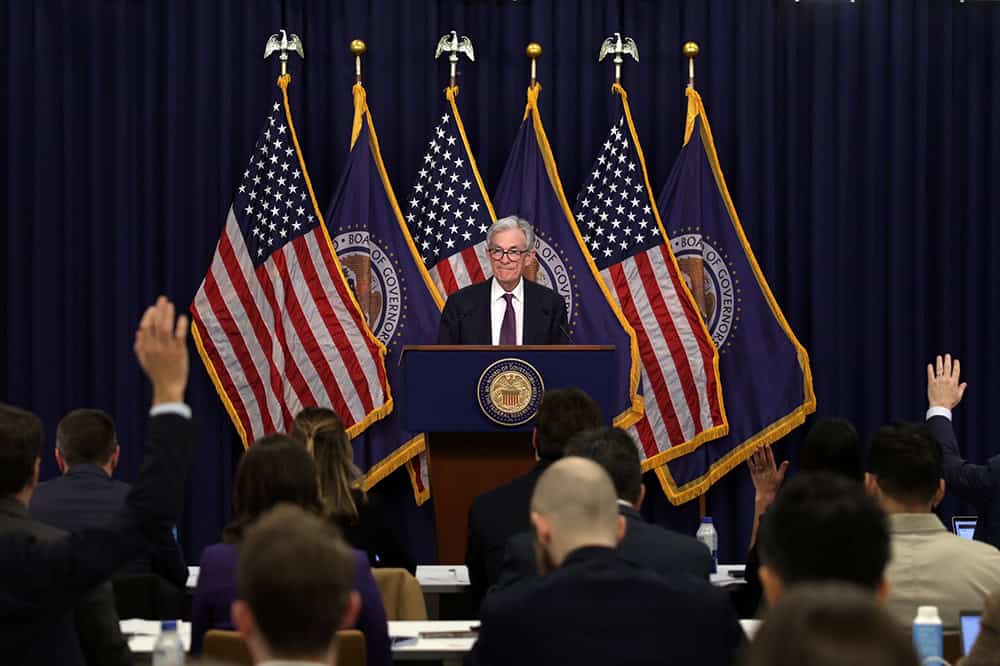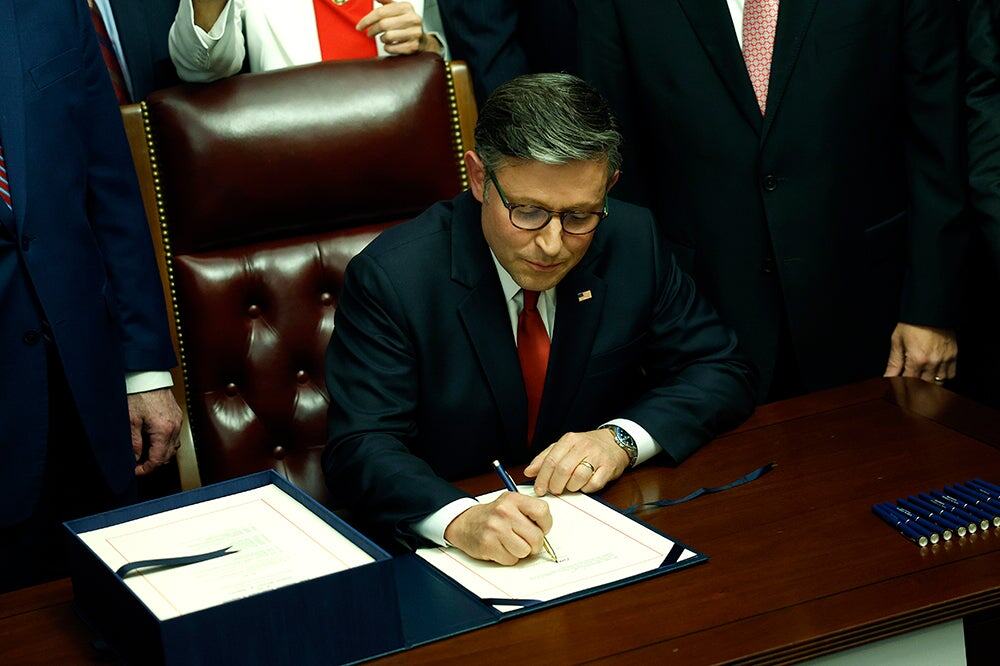Mayor Michael R. Bloomberg, Secretary Julián Castro, Former CBO Director Douglas Elmendorf and Top Lawmakers Discuss ‘Opportunity for America’ at Peterson Foundation Fiscal Summit in Washington
Leading experts and policymakers to explore the connection between America's long-term fiscal outlook and economic growth and opportunity
Participants include: House Majority Leader Kevin McCarthy; House Minority Whip Steny Hoyer; House Budget Chair Tom Price; Admiral Mike Mullen; Former White House Chiefs of Staff Joshua Bolten, Andrew Card and William Daley; Alan Greenspan; Michèle Flournoy; Lawrence Lindsey; Richard Fisher; Wendy Kopp; and more
WASHINGTON, D.C. — Leading experts and policymakers convene today in Washington to discuss “Opportunity for America” at the Peter G. Peterson Foundation’s sixth annual Fiscal Summit. Respected voices from across the political and ideological spectrum — including elected officials, economic policy experts and current and former high-level administration officials — will examine the state of economic opportunity in America today, and the opportunity the nation has to address its long-term debt and build a vibrant, growing economy of the future.
As the economic recovery takes hold, Americans across party lines believe that the country’s renewed economic stability creates an opportunity for the government to address the country’s fiscal challenges. According to a new poll released by the Peterson Foundation, 78 percent of voters agree that now is a good time for the government to develop a long-term plan for the debt because it is not facing an immediate short-term economic crisis, including over three-quarters of Democrats (78 percent), Republicans (76 percent), and Independents (80 percent). Additionally, 78 percent of voters agree that there will be more opportunities for everyday Americans to be successful if the economy is less burdened by the national debt, including a majority (52 percent) who feel strongly.
At the 2015 Fiscal Summit, the Foundation will unveil the results of its Solutions Initiative III, a research project that brings together policy organizations from across the ideological spectrum to put forth their own comprehensive fiscal solutions. Experts from five leading organizations — the American Action Forum, the American Enterprise Institute, the Bipartisan Policy Center, the Center for American Progress, and the Economic Policy Institute — will discuss their just released plans to stabilize America’s debt over the long term.
“America’s economic strength is ultimately dependent on its long-term fiscal health,” said Foundation Founder and Chairman Peter G. Peterson. “Recent improvements in the economy are encouraging, but far too many Americans have been left behind. To ensure a lasting and inclusive recovery, we must address our unsustainable long-term debt. Doing so will ensure we have the resources to invest in our own future, through key priorities like infrastructure, research, and education.”
“Building a strong fiscal foundation is a necessary step in ensuring that all Americans can have the opportunity to benefit from a growing U.S. economy,” said Foundation President and CEO Michael A. Peterson. “The good news is that many solutions are available to put our nation on a better path, and an overwhelming majority of Americans — across party lines — agree now is the right time to address our fiscal challenges and create more opportunity for America.”
2015 Summit participants will include:
- Josh Bivens, Research and Policy Director for the Economic Policy Institute
- Michael R. Bloomberg, CEO of Bloomberg L.P.; Former New York City Mayor
- Joshua B. Bolten, Managing Director of Rock Creek Global Advisors LLC; Former White House Chief of Staff under President George W. Bush
- Andrew H. Card, President of Franklin Pierce University; Former White House Chief of Staff under President George W. Bush
- Secretary Julián Castro, Secretary of the U.S. Department of Housing and Urban Development
- William M. Daley, Managing Partner and Head of U.S. Operations of Argentière Capital; Former Secretary of Commerce; Former White House Chief of Staff under President Barack Obama
- Douglas Elmendorf, Former Director of the Congressional Budget Office
- Richard W. Fisher, Former President and CEO of the Federal Reserve Bank of Dallas
- Michèle Flournoy, CEO of the Center for a New American Security; Former Under Secretary of Defense for Policy
- Alan Greenspan, President of Greenspan Associates, LLC; Former Chairman of the Federal Reserve Board
- Jason Grumet, Founder and President of the Bipartisan Policy Center
- Naomi Hirabayashi, Chief Marketing Officer at DoSomething.org
- Douglas Holtz-Eakin, President of the American Action Forum; Former Director of the Congressional Budget Office
- House Democratic Whip Steny Hoyer (D-MD)
- Wendy Kopp, CEO and Co-founder of Teach for All
- Lawrence B. Lindsey, President and CEO of The Lindsey Group; Former National Economic Council Director and Governor of the Federal Reserve Board
- House Majority Leader Kevin McCarthy (R-CA)
- Admiral Mike Mullen, USN (Ret.), President of MGM Consulting, LLC; 17th Chairman of the Joint Chiefs of Staff
- Representative Tom Price (R-GA), Chairman of the House Budget Committee
- Lena Shi, Alumna and Advisory Council Member, Up to Us–University of Virginia Team; Presidential Management Fellow, U.S. Department of Education
- Neera Tanden, President of the Center for American Progress
- Marc S. Tucker, President and CEO of the National Center on Education and the Economy
- Alan Viard, Resident Scholar at the American Enterprise Institute
- Peter G. Peterson, Founder and Chairman of the Peter G. Peterson Foundation
- Michael A. Peterson, President and CEO of the Peter G. Peterson Foundation
The Summit will also show an opening video featuring a range of perspectives from leaders in policy, academia, and business, including:
- Raj Chetty, William Henry Bloomberg Professor of Economics, Harvard University
- Ray Dalio, Founder of Bridgewater Associates
- Glenn Hubbard, Dean of the Columbia Business School; Former Chairman of the Council of Economic Advisers under President George W. Bush
- Alice Rivlin, Leonard D. Schaeffer Chair in Health Policy Studies and Director of the Center for Health Policy at the Brookings Institution; Former Director of the Congressional Budget Office
- Lawrence H. Summers, Charles W. Eliot University Professor and President Emeritus at Harvard University; Former Treasury Secretary and Former National Economic Council Director under President Bill Clinton
Moderators and interviewers for the Summit will include:
- Dana Bash, Chief Congressional Correspondent, CNN
- John Harwood, Chief Washington Correspondent, CNBC; Political writer, The New York Times
- Betty Liu, Anchor, Bloomberg Television
- Annie Lowrey, Contributing Editor and Economic Columnist, New York Magazine
- Ruth Marcus, Columnist, The Washington Post
- David Sanger, National Security Correspondent, The New York Times
- David Wessel, Director of the Brookings Institution Hutchins Center on Fiscal and Monetary Policy; Contributing Correspondent, The Wall Street Journal
Americans of all political backgrounds believe that action to address the national debt will produce significant, long-term benefits for the economy, according to a national survey conducted by Global Strategy Group and North Star Opinion Research for the Peter G. Peterson Foundation. Key findings from this survey include:
Voters, including wide majorities of Democrats, Republicans and Independents, want greater focus on the debt now that the economy is more stable:
- Nearly eight in ten (78 percent) agree that now is a good time for the government to develop a long-term plan for the debt because it is not facing an immediate short-term economic crisis, including more than three-quarters of Democrats (78 percent), Republicans (76 percent), and Independents (80 percent).
- Nearly two-thirds (64 percent) believe the federal government can focus on stabilizing the debt without putting the economic recovery at risk.
– Voters of all socioeconomic backgrounds agree that the economy is stable enough to handle action on the national debt, including self-described lower/middle class voters (63 percent), middle class voters (64 percent), and upper middle class (68 percent).
Voters believe a strong fiscal foundation will produce a stronger economy:
- Nearly eight in ten voters (78 percent) agree that there will be more opportunities for everyday Americans to be successful if the economy is less burdened by the national debt, including half (52 percent) who feel strongly.
– Again, voters across socioeconomic lines reach a clear consensus as 80 percent of working/lower middle class voters, 78 percent of middle class voters, and 74 percent of upper middle class/affluent voters agree that a lower debt burden will lead to greater opportunity for the average worker. - More than three-quarters of voters (77 percent) support the government making necessary choices now to reduce the debt so that the economy will be stronger in the long run, including approximately half (49 percent) who agree strongly. Reducing the debt’s burden on the national economy remains a consistent priority for voters, with 77 percent also agreeing with the same statement in April 2014.
– Voters across the political spectrum, including 73 percent of Democrats, 76 percent of Republicans, and 80 percent of Independents, all support action on the debt to strengthen the economy in the long run. - Seventy-two percent agree that more small businesses will be able to get the loans they need to start up and grow if the government stabilizes the national debt.
- Sixty-seven percent agree that the United States will be able to create a more highly educated and better trained workforce if the government stabilizes the national debt.
More information about the Summit is available at: www.fiscalsummit.org.
About the Peter G. Peterson Foundation
The Peter G. Peterson Foundation is a nonprofit, nonpartisan organization that is dedicated to increasing public awareness of the nature and urgency of key fiscal challenges threatening America’s future, and to accelerating action on them. To address these challenges successfully, we work to bring Americans together to find and implement sensible, long-term solutions that transcend age, party lines and ideological divides in order to achieve real results. To learn more, please visit www.pgpf.org.
Further Reading
Quiz: How Much Do You Know About Healthcare in the United States?
The United States has one of the largest and most complex healthcare systems in the world. Take our healthcare quiz to see how much you know about the cost and quality of the U.S. healthcare system.
The Fed Reduced the Short-Term Rate Again, but Interest Costs Remain High
High interest rates on U.S. Treasury securities increase the federal government’s borrowing costs.
How Did the One Big Beautiful Bill Act Change Tax Policy?
See how OBBBA restructured the tax landscape across four major areas: individual tax provisions, business tax provisions, energy tax credits, and health-related tax changes.


